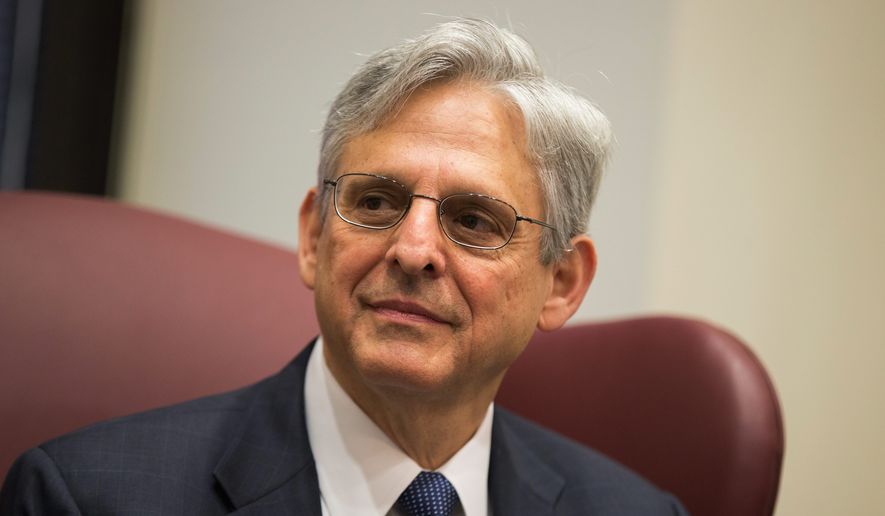Merrick Garland got shut out.
Democrats still insist that President Obama’s pick to fill the vacant Supreme Court seat will be a major factor for voters in November — but the party’s top leaders didn’t mention him during hours of prime-time speeches at their national convention last week.
Several mentioned the importance of the Supreme Court, but Judge Garland wasn’t even a footnote to those speeches, with leaders potentially forgoing their best chance to turn his confirmation into a voting issue.
“If it had any salience on the electorate, it would be a ‘check the box’ activity for most candidates,” said Josh Holmes, a former chief of staff to Senate Majority Leader Mitch McConnell, Kentucky Republican. “It’s not even a ‘check the box’ issue.”
Democrats insist that voters do care about Judge Garland, whose nomination has been held up for months. Republicans say the next president should have the power to choose the next Supreme Court justice.
As if to make up for failing to mention Judge Garland at the convention, Vice President Joseph R. Biden used the White House weekly address to demand action on the nomination.
But neither Mr. Biden nor Mr. Obama nor former President Bill Clinton mentioned Judge Garland during their prime-time speeches in Philadelphia last week.
Democratic presidential nominee Hillary Clinton likewise did not mention Judge Garland in her Thursday evening speech, though she did include a line about appointing Supreme Court justices who will act on getting money out of politics and expanding voting rights.
Senate Minority Leader Harry Reid, Nevada Democrat, had been hammering Mr. McConnell and other Senate Republicans for months for refusing to hold confirmation hearings or a vote on whether Judge Garland should fill the vacancy left by the death of Justice Antonin Scalia.
Mr. Reid didn’t mention the court in his speech at the Democratic National Convention in Philadelphia, though he did attack Mr. McConnell as “craven” and slammed Republican presidential nominee Donald Trump.
The Senate Democrats’ campaign arm said their candidates will continue to talk about the issue in the coming months, but two of their candidates in key races — Katie McGinty of Pennsylvania and Rep. Tammy Duckworth of Illinois — opted not to mention Judge Garland in their DNC speeches.
“Considering the proximity to all their statements about the electoral apocalypse that would befall Republicans if they were to oppose Merrick Garland, I think it’s really humorous,” Mr. Holmes said.
On the heels of the convention, the White House used its weekly address to have Mr. Biden emphasize the issue.
“For the sake of the country we love, we all have to do our job,” Mr. Biden said. “The president has done his. Senate Republicans must do theirs.”
Republicans have cited comments Mr. Biden made about a theoretical Supreme Court vacancy in 1992 as part of their rationale for the delay.
Mr. Biden, then chairman of the Senate Judiciary Committee, said President George H.W. Bush should consider a delay in naming a nominee until after the presidential election that year. As vice president, he has said those remarks have been misconstrued.
Some polling has shown that voters generally support hearings for Judge Garland, but they also say it’s not a make-or-break issue.
Data from the Democrat-leaning Public Policy Polling firm showed that at least 60 percent of voters in Arizona, Iowa, New Hampshire, Ohio, Pennsylvania and Wisconsin said they support hearings for Judge Garland.
But in every state but Wisconsin, the incumbent Republican senator either led or was essentially tied with the Democratic opponent or would-be opponent in the polling.
Republican Party strategist Ford O’Connell said the problem for Democrats is that most voters know little about the Supreme Court and the delay in acting on Judge Garland’s nomination is not the electoral winner they thought it would be.
“So this is not an oversight. They just realize it is not an effective argument to rally their troops,” he said.
Conversely, Republican leaders have been using the issue as something of a rallying cry for voters who otherwise might be hesitant to support Mr. Trump.
In his speech accepting the Republican presidential nomination in Cleveland last month, Mr. Trump affirmed that he would appoint Supreme Court justices “who will uphold our laws and our Constitution.”
Mr. Trump also extended an olive branch to conservatives by releasing a list of about a dozen potential picks in May that attracted widespread praise among conservative groups, notably pro-life organizations.
On the Democratic side, it was Sen. Bernard Sanders, whose vocal band of supporters was creating headaches for the party last week, who used the Supreme Court to make a case against Mr. Trump.
“If you don’t believe that this election is important, if you think you can sit it out, take a moment to think about the Supreme Court justices that Donald Trump would nominate and what that would mean to civil liberties, equal rights and the future of our country,” Mr. Sanders said.
But such direct invocations were rare in Philadelphia, and Mr. Holmes cautioned voters to consider the source of the initial push for Judge Garland.
“From Reid and [Sen. Charles E.] Schumer, this is a crew who convinced Democratic senators that Obamacare was going to be the most popular thing in the world [if] they just passed it,” Mr. Holmes said. “Many of whom, by the way, are no longer senators as a result.
“So I think their political acumen on these issues has a lot left to be desired,” he said.
• David Sherfinski can be reached at dsherfinski@washingtontimes.com.




Please read our comment policy before commenting.